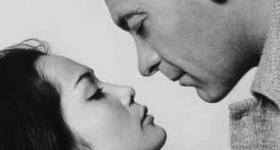Certain characters — like Dookie and Grandma — really held my attention,
but I would have liked a more fully dimensional character for Ween. She
seemed kind of random — an accomplice to the boys’ hijinks — we never learn
if she has a story of her own. She was more of an accessory to Sam and
Dookie than a real person.
The score was fitting — it featured local indie bands and gave extra
oomph to carry the narrative. Amazingly, it was all arranged within the
constraints of a $3,000 music budget.
After the screening, Radtke invited a bunch of cast and crew up for
audience Q & A. He said that "The Speed of Life" had been his most
difficult film to make, and discussed the challenges of completing such
an ambitious project with so little money. He also said the film is
somewhat autobiographical, reflecting his own involvement with the
juvenile justice system and probation officers as a youth.
Interestingly, when Radtke worked at a nonprofit called the Lift
Project, he used the screenplay as the basis for media workshops with
at-risk youth. These youth (some of whom were in the audience)
contributed ideas and footage that were included in the final cut.
Here’s a link to the trailer. And film site.
Neither Vice nor Virtue
Next up was the shorts program Neither Vice nor Virtue, which featured
glimpses into the “dark side” of “personal and shared fulfillment.”
"Bookie," directed by Quoc Bao Tran and in pre-production for two years,
is a stylish noir shot in black and white about a bookie caught in a
lover’s dispute between a beautiful waitress and a gangster boss. It
offers plenty of slinky dialogue and bloody back-alley brawls — so I had
to watch through my fingers. The bar scenes and multiracial cast
reflect the diverse 1960s jazz and soul scene in Seattle, where Tran is
from. Being a fellow Seattleite, I went up to Bao afterwards to tell
him how I appreciated this multiculti historical element, and promptly
embarrassed myself by confusing his short with Blood Debts, made by the
OTHER Vietnamese American director. Sigh. This is why I should not be
allowed to talk to people. But I digress — this is a really elegant
work — check it out if you can.
"Blood Debts," directed by Roland Nguyen, has a gritty 1970s cop show
feel. Johnny, who is Vietnamese and white, is ordered by his gang boss
to kill an old (white) family friend in order to prove loyalty to his
roots. Tragic Mulatto! Dastardly Asian Gangsters! Caught Between Two
Worlds! I recognized the awesome Long Nguyen from "Journey from the
Fall." Despite the film’s dark subject matter, it has some really funny
moments, like when this little white girl bugs Nguyen’s character about
his fish-flavored pastries while he waits for his friend to make the
kill.
Here’s a link to the teaser.
"Swingers Club Sachi," directed by Hiroo Takaoka, revolved around a
conversation between a sexually frustrated Yakuza wife and the swingers
bar owner. And there are aliens watching. Creeeepy! The pacing is a bit
slow and it felt kinda dialogue — heavy…until — spoiler alert — someone gets
shot! Takaoka stated during Q&A that he made the film in response
to the issue of mental health and grotesque homicides in Japan.
"Red-Light District Graffiti," filmed in Japan by director Kasumi Hiraoka: Ok. Maybe I just don’t “get” experimental film, but I found this one
especially painful to watch. While I understand that they were supposed
to be rejecting conventional society, I got tired of 30 minutes of
war-painted Japanese prostitutes writhing around in the dirt and
whooping gibberish through trash-strewn alleyways. It seemed to drag on
forever, and deteriorated into a psychedelic hot mess of screeching and
Day-Glo images that hurt my brain. For all its noisy avant-garde, uh,
-ness, I was still pretty bored.
Also, I know I’m coming from a different (non-Japanese) cultural
context, but I was squirming in my chair watching these young Japanese
girls disrobe, lick their lips, spread their legs and so on. I’m not
sure what the filmmaker was trying to communicate with these scenes,
but given that I’m viewing this from an Asian American perspective, it
triggered my own discomfort with the tired but still damaging imagery
of exotic, hyper-sexualized Asian women.
So, this one was not my favorite, although I’m sure it has its own experimental artistic merits that are just over my head.
ANYhoo… wrapping up the shorts program was "Loving Work," directed by
Vivian Wenli Lin, who was recently awarded a media project grant from
Mama Cash. It follows a couple working in the Amsterdam sex industry
(specializing in good ol’ S&M, BDSM, and Bondage!). Tigerr, with
her multiple “Property of Simon” tats (and terrifyingly large fake
titties) discussed the difficulty of explaining what “fetish work”
means to her Chinese parents. Awkward! I would rather drink a can of
Raid than talk about that with mine. The topic was of course
fascinating, although I was also kinda grossed out by all the whips ’n
chains ’n thangs — I’m a prude. Vivian also captured the couple’s playful
and affectionate moments outside of their atypical work life,
challenging viewers to suspend judgment about the nature of their
relationship.
Cynthia Brothers is guest-blogging for Hyphen.
This blog entry is graciously sponsored by Toyota Matrix. Check out
their Director's Chair website dedicated to the best in Asian American
film.









Comments